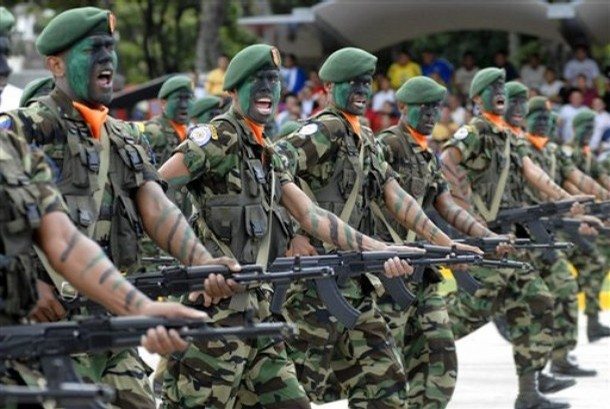Venezuela’s relationship with Russia under President Hugo Chávez’s regime again proved to be a fruitful one for the country’s defence industry in late 2011. Venezuela’s defence expenditure will receive a major boost from a US$4bn loan secured from Russia in October 2011. The deal, which comes in exchange for oil and gas projects, will provide half the funds in 2012 and the remaining half in 2013, while Russian firms Rosneft and Gazprom secure projects within the energy sector. The deal was signed with Venezuela’s Petroleos de Venezuela. BMI expects to see Venezuela’s defence expenditure grow by as much as 27.34% to VEB17.22bn (US$4bn) in 2011, with growth set to decline year-on-year (y-o-y) until 2015. Beyond the middle of the decade, BMI sees Venezuelan defence expenditure growing by 14% y-oy through to 2031.
In terms of relations with neighbours, Colombia’s President Juan Manuel Santos stated in April 2011 that there are no longer any Colombian rebels in Venezuela. Santos also thanked Venezuela for handing over two alleged members of the ELN guerrilla group on April 11. Former Colombian president Alvaro Uribe had accused Venezuela of harbouring Fuerzas Armadas Revolucionarias de Colombia (FARC) rebels, which resulted in a breakdown of bilateral ties in 2010. During a visit to Madrid, Santos said the rebel camps identified on Venezuelan soil last year by Colombian intelligence are no longer there.
Meanwhile, Venezuelan and Guyanan held a meeting in September 2011 on a territorial dispute along their shared border. Venezuela attempted to play down the dispute, with Organisation of American States (OAS) ambassador Roy Chaderton arguing that opponents of President Chávez were deliberately stoking the controversy in order to create conditions for military action by the US or NATO.
Less positively, the US government revoked the visa of Bernardo Álvarez, Venezuela’s ambassador to Washington in September 2011. The move is the latest in a five-month diplomatic dispute between the two nations. Venezuelan President Hugo Chávez has refused to accept Larry Palmer as the US government’s new envoy to Caracas and sent an official letter of protest rejecting the nominee on December 20.
Regarding internal security, we expect political risks in Venezuela to remain elevated in the run-up to the presidential election in December 2012. While Venezuela’s presidential election is still a long way off, in our view much economic and social policy over the next 18 months will be geared towards the poll in December 2012 as incumbent President Hugo Chávez flexes his decree powers. During this period, we believe elevated inflation and further nationalisations will continue to blot the political landscape, while wrangling with the opposition is likely to intensify after the Mesa de la Unidad Democratica (MUD) candidate is chosen in the primary held in February 2012.










